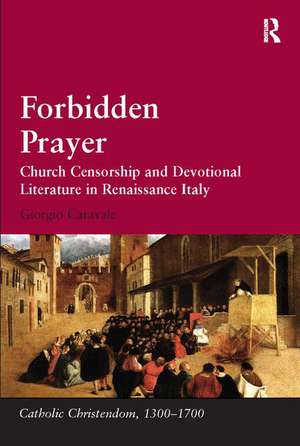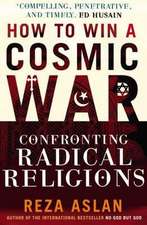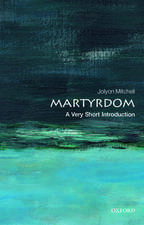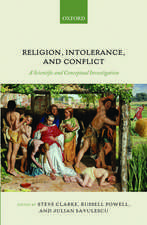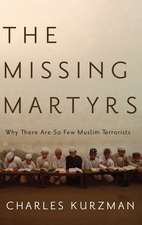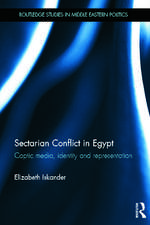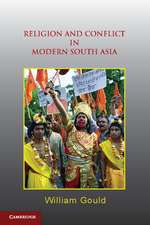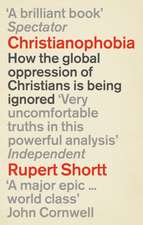Forbidden Prayer: Church Censorship and Devotional Literature in Renaissance Italy: Catholic Christendom, 1300-1700
Autor Giorgio Caravaleen Limba Engleză Paperback – 22 mai 2017
| Toate formatele și edițiile | Preț | Express |
|---|---|---|
| Paperback (1) | 299.52 lei 43-57 zile | |
| Taylor & Francis – 22 mai 2017 | 299.52 lei 43-57 zile | |
| Hardback (1) | 824.40 lei 43-57 zile | |
| Taylor & Francis – 28 ian 2012 | 824.40 lei 43-57 zile |
Din seria Catholic Christendom, 1300-1700
- 9%
 Preț: 1038.68 lei
Preț: 1038.68 lei - 15%
 Preț: 269.84 lei
Preț: 269.84 lei - 18%
 Preț: 1000.27 lei
Preț: 1000.27 lei -
 Preț: 388.13 lei
Preț: 388.13 lei -
 Preț: 416.22 lei
Preț: 416.22 lei - 25%
 Preț: 825.06 lei
Preț: 825.06 lei -
 Preț: 416.22 lei
Preț: 416.22 lei -
 Preț: 469.34 lei
Preț: 469.34 lei - 18%
 Preț: 1055.69 lei
Preț: 1055.69 lei - 18%
 Preț: 1054.71 lei
Preț: 1054.71 lei - 18%
 Preț: 1060.25 lei
Preț: 1060.25 lei - 18%
 Preț: 1008.17 lei
Preț: 1008.17 lei - 18%
 Preț: 1062.62 lei
Preț: 1062.62 lei -
 Preț: 436.14 lei
Preț: 436.14 lei - 18%
 Preț: 1063.41 lei
Preț: 1063.41 lei - 15%
 Preț: 259.31 lei
Preț: 259.31 lei - 25%
 Preț: 767.95 lei
Preț: 767.95 lei -
 Preț: 465.39 lei
Preț: 465.39 lei - 18%
 Preț: 1059.45 lei
Preț: 1059.45 lei - 16%
 Preț: 237.38 lei
Preț: 237.38 lei - 18%
 Preț: 1054.71 lei
Preț: 1054.71 lei - 18%
 Preț: 1054.71 lei
Preț: 1054.71 lei - 25%
 Preț: 769.92 lei
Preț: 769.92 lei -
 Preț: 436.14 lei
Preț: 436.14 lei - 18%
 Preț: 1054.71 lei
Preț: 1054.71 lei -
 Preț: 436.14 lei
Preț: 436.14 lei - 18%
 Preț: 1061.81 lei
Preț: 1061.81 lei - 26%
 Preț: 822.76 lei
Preț: 822.76 lei - 18%
 Preț: 1116.27 lei
Preț: 1116.27 lei - 18%
 Preț: 1056.14 lei
Preț: 1056.14 lei - 18%
 Preț: 1000.27 lei
Preț: 1000.27 lei - 18%
 Preț: 1109.18 lei
Preț: 1109.18 lei - 16%
 Preț: 260.73 lei
Preț: 260.73 lei - 26%
 Preț: 821.53 lei
Preț: 821.53 lei - 18%
 Preț: 1005.01 lei
Preț: 1005.01 lei - 26%
 Preț: 820.71 lei
Preț: 820.71 lei - 18%
 Preț: 1008.86 lei
Preț: 1008.86 lei
Preț: 299.52 lei
Preț vechi: 341.55 lei
-12% Nou
Puncte Express: 449
Preț estimativ în valută:
57.31€ • 59.99$ • 47.70£
57.31€ • 59.99$ • 47.70£
Carte tipărită la comandă
Livrare economică 31 martie-14 aprilie
Preluare comenzi: 021 569.72.76
Specificații
ISBN-13: 9781138110984
ISBN-10: 1138110981
Pagini: 308
Dimensiuni: 156 x 234 mm
Greutate: 0.45 kg
Ediția:1
Editura: Taylor & Francis
Colecția Routledge
Seria Catholic Christendom, 1300-1700
Locul publicării:Oxford, United Kingdom
ISBN-10: 1138110981
Pagini: 308
Dimensiuni: 156 x 234 mm
Greutate: 0.45 kg
Ediția:1
Editura: Taylor & Francis
Colecția Routledge
Seria Catholic Christendom, 1300-1700
Locul publicării:Oxford, United Kingdom
Notă biografică
Giorgio Caravale (PhD 2000) is Tenured Assistant Professor of Early Modern European History at the University of Roma Tre. He was Lila Wallace - Reader's Digest Fellow at the Harvard University Center for Renaissance Studies in Florence, Villa I Tatti (2006-2007), Fellow at the Italian Academy for Advanced Studies at Columbia University (2009-2010) and Lauro De Bosis Lecturer in the History of Italian Civilization at Harvard University (2010-2011). He is the author of Sulle tracce dell'eresia. Ambrogio Catarino Politi (1484-1553), 2007 and Il profeta disarmato. L'eresia di Francesco Pucci nell'Europa del Cinquecento, 2011.
Recenzii
'... a substantial contribution to the history of the vernacular religious book in early modern Italy... Recommended.' Choice 'Forbidden Prayer promises to be a fruitful addition to the library of many early modern scholars whatever their stage of career.' Renaissance & Reformation 'What emerges is a careful account of how the Roman authorities sought to shape and control popular devotion... the contemporary parallels are fascinating.' Church Times 'Presenting such a thought-provoking book to readers of English is commendable. Caravale reconstructs, in admirable detail, the interventions of individual censors into specific texts to build his case, complemented by both Congregations’ correspondence with regional tribunals.' Renaissance Quarterly 'This book will be of use to those interested in the spread and reception of evangelical ideas in predominantly Roman Catholic areas and Roman efforts to combat those ideas. It will also be of interest to anyone interested in how churches decide what is heretical and what is orthodox and attempt to convince their adherents to use only approved materials.' Lutheran Quarterly 'By approaching these decades through the lens of prayer, Caravale’s work offers an important new discussion of both reactions to Protestantism and internal Catholic reform within Italy. His account of expositions of the Lord’s Prayer is particularly instructive, and he offers a wealth of fascinating examples of superstitious and incorrect devotional texts that were reported to Rome by local inquisitors. One of the strengths of this book is its detailed use of archival sources, and the generous quotations taken from these will be of great use to other scholars. This English translation is to be warmly welcomed for making Caravale’s work available to a much larger audience.' English Historical Review
Cuprins
Part I Inner Devotion, Lutheranism, and Church Censorship in the First Half of the Sixteenth Century; Chapter 1 The Pater Noster from Savonarola to Seripando; Chapter 2 Mental Prayer and the Spirituali; Chapter 3 Serafino da Fermo and Lorenzo Davidico; Chapter 4 Pier Paolo Vergerio and the Antidevotional Controversy; Part II Superstitious Prayer and Mystic Prayer; Chapter 5 Towards Renewed Inwardness; Chapter 6 Mental Prayer and Catholic Orthodoxy; Chapter 7 Censorship and Self-Censorship in the 1580s; Chapter 8 From Heresy to Liturgy; Part III Toward the Failure of the Struggle against Superstition; Chapter 9 The Making of Liturgic Uniformity; Chapter 10 A Fight against Superstition or a Struggle against the Illiterates?; Chapter 11 First Signs of Surrender; Chapter 12 Roberto Bellarmino and Tommaso Campanella;
Descriere
This book provides one of the first studies on ecclesiastical censorship entirely based on documents from the Holy Office Archives that up to 1998 were inaccessible to the great majority of scholars. It provides for the first time a general overview of ecclesiastical political strategies toward a crucial field of sixteenth-century religious book production, the vernacular devotional literature. In so doing it offers a fascinating insight into the Church's attempt to purge Catholic devotional works of heterodox beliefs and superstitious elements.
